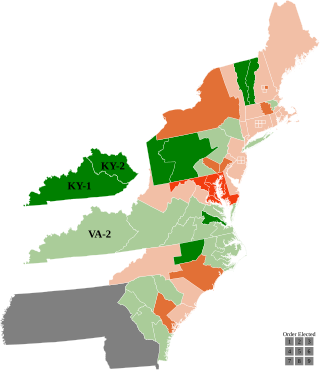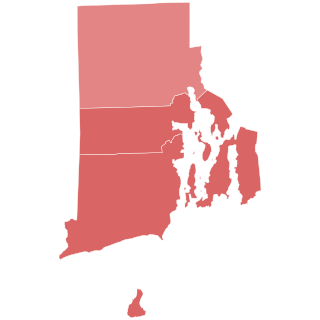
The State of Rhode Island General Assembly is the state legislature of the U.S. state of Rhode Island. A bicameral body, it is composed of the lower Rhode Island House of Representatives with 75 representatives, and the upper Rhode Island Senate with 38 senators. Members are elected in the general election immediately preceding the beginning of the term or in special elections called to fill vacancies. There are no term limits for either chamber. The last General Assembly election took place on November 3, 2020.
These are tables of congressional delegations from Rhode Island to the United States Senate and United States House of Representatives.

William Sprague, also known as William III or William Sprague III, was a politician and industrialist from the U.S. state of Rhode Island, serving as the 14th Governor, a U.S. Representative and a U.S. Senator. He was the uncle of William Sprague IV, also a Governor and Senator from Rhode Island.

The 1806–07 United States House of Representatives elections were held on various dates in various states between April 29, 1806 and August 4, 1807. Each state set its own date for its elections to the House of Representatives before the first session of the 10th United States Congress convened on October 26, 1807. They occurred during Thomas Jefferson's second term. Elections were held for all 142 seats, representing 17 states.

The 1792–93 United States House of Representatives elections were held on various dates in various states between August 27, 1792, and September 6, 1793. Each state set its own date for its elections to the House of Representatives before the first session of the 3rd United States Congress convened on December 2, 1793. With the addition of the new state of Kentucky's representatives, and the congressional reapportionment based on the 1790 United States census, the size of the House increased to 105 seats.

The 1790–91 United States House of Representatives elections were held on various dates in various states between April 27, 1790, and October 11, 1791. Each state set its own date for its elections to the House of Representatives before or after the first session of the 2nd United States Congress convened on October 24, 1791. This was the first midterm election cycle, which took place in the middle of President George Washington's first term. The size of the House increased to 67 seats after the new state of Vermont elected its first representatives.

William Warner Hoppin was the 24th Governor of Rhode Island from 1854 to 1857.
Gideon Barstow was a U.S. Representative from Massachusetts. Born in Mattapoisett, Massachusetts, Barstow attended the common schools and Brown University, Providence, Rhode Island from 1799 to 1801. He studied medicine, was admitted to practice and settled in Salem, Massachusetts. He served as member of the State constitutional convention in 1820.
Robert Bennie Cranston was a U.S. Representative from Rhode Island, brother of Henry Young Cranston.

The government of the state of Rhode Island is prescribed from a multitude of sources; the main sources are the Rhode Island Constitution, the General Laws, and executive orders. The governmental structure is modeled on the Government of the United States in having three branches: executive, legislative, and judicial.

The 2008 United States presidential election in Rhode Island took place on November 4, 2008, and was part of the 2008 United States presidential election. Voters chose four representatives, or electors to the Electoral College, who voted for president and vice president.

The 2000 United States Senate election in Rhode Island was held on November 7, 2000. Republican U.S. Senator John Chafee had announced in 1999 that he would not seek reelection, leading his son, Lincoln Chafee, to announce his own candidacy. The elder Chafee, however, died a few months later; his son was appointed to fill the remainder of the unexpired term. The younger Chafee, now the incumbent, sought a full term and won, defeating Democratic U.S. Representative Bob Weygand. As of 2024, this was the last congressional election in Rhode Island to be won by a Republican.

Of the 2 Rhode Island incumbents, neither were re-elected.

In September 1808, the Federalist ticket won a majority in Rhode Island's election for delegates to the United States Congress, with nearly 500 votes.

Rhode Island elected its two members at-large on separate tickets.

The 2020 United States Senate election in Rhode Island was held on November 3, 2020, to elect a member of the United States Senate to represent the State of Rhode Island, concurrently with the 2020 U.S. presidential election, as well as other elections to the United States Senate, elections to the United States House of Representatives and various state and local elections. Incumbent Democratic Senator Jack Reed was challenged by Republican nominee Allen Waters. Waters was later disavowed by the state Republican Party after charges of domestic assault in 2019 became public.

The 2018 United States House of Representatives elections in Rhode Island were held on November 6, 2018, to elect the two U.S. representatives from the state of Rhode Island, one from each of the state's 2 congressional districts. The election coincided with the 2018 U.S. mid-term elections, as well as other elections to the House of Representatives, elections to the United States Senate and various state and local elections. The primaries took place on September 12.

The 1860 United States presidential election in Rhode Island took place on November 2, 1860, as part of the 1860 United States presidential election. Voters chose four electors of the Electoral College, who voted for president and vice president.

The 2020 United States House of Representatives elections in Rhode Island was held on November 3, 2020 to elect the two U.S. representatives from the state of Rhode Island, one from each of the state's 2 congressional districts. The elections will coincide with the 2020 U.S. presidential election, as well as other elections to the House of Representatives, elections to the United States Senate and various state and local elections.

The 2022 Rhode Island House of Representatives elections took place on November 8, 2022. Primary elections were held on September 13, 2022. Rhode Island voters elected state representatives in all 75 seats of the House of Representatives to serve two-year terms.














